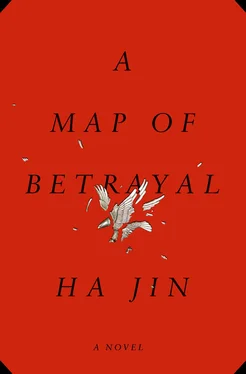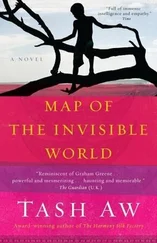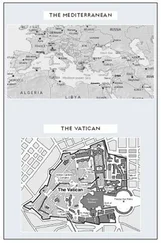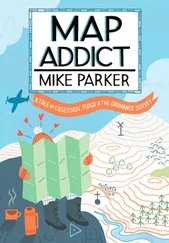“You didn’t become a general?”
“I’d been a colonel … for more than twenty years before I retired. I thought they might give me the big promotion, but they did not, because I didn’t have enough pull and resources.”
“What do you mean by ‘resources’?”
“Basically money and wealth. You had to bribe the people in key positions. At any rate, Gary was different from the rest of us … and earned his promotions, granted directly from the top. To tell the truth, in the seventies, my colleagues would pronounce his name with reverence.”
“You mean they regarded him as a hero?”
“Also a legend.”
Again my father’s gaunt face appeared in my mind’s eye, but I suppressed it. I looked through my list of questions and asked again, “Uncle Bingwen, did you ever meet my father’s first wife, Yufeng Liu?”
His face fell as if I had hit a wrong note. He said, “I met her once, in nineteen sixty … when I went down to the countryside to attend … your grandfather’s funeral. We used to mail her money every month, but later we lost contact. She left their village in the early sixties. I have no idea where she is now … or if she’s still alive.”
“You have no information on her at all?”
“I have something.” He stood and went over to a bookcase. He pulled open a drawer, took out a spiral notebook, and tore off a page. “Here’s her old address in the countryside. Like I said, she relocated, so we stopped sending her Gary’s salary.”
I folded the paper and put it into my inner jacket pocket. “Why wouldn’t she let you know her new address so that she could get paid?” I asked.
“Money became worthless during the three famine years. I guess that could be a reason. Or maybe she got married again … and wouldn’t want to be tied to your dad legally anymore.”
We went on to talk about my father’s personal relationship with his handler. Chu insisted that the two of them had been bound together “like a pair of grasshoppers on one string.” It was Gary’s role as a top agent in the enemy’s heart, the CIA, that helped Chu, Gary’s sole handler, survive the political shifts and consolidate his position in intelligence circles in Beijing. For that he was still grateful to my father. In his view Gary was undoubtedly a hero, whose deeds all the Chinese should remember.
Chu seemed to be carried away by his remembrances, growing warmer and chattier as he went on. Evidently he had few opportunities to speak his mind like this. While I was wondering if it was time to take my leave, he said, “Do you know … you have some half siblings?”
“My father mentioned them in his diary. But he spent only a few weeks with Yufeng before he left home. Are you sure they’re his children?”
Chu chuckled. “Absolutely. Yufeng gave birth to twins, a boy and a girl, in the fall of 1949. I told your father about them. The two kids really took after him.”
His words, though casually said, struck me, and my cheeks heated up. I had known about my half siblings but questioned their paternity. Something like a wash of shame crept over me as I realized I had unconsciously attempted to distance my half siblings from our father ever since I came to know of their existence. Before saying good-bye, I held Chu’s blotchy hand with both of mine and thanked him for speaking to me.
Now I was more determined than ever to find my father’s first family.
Gary had been in Okinawa since the previous winter, working for a U.S. radio station with which his former cultural agency had merged. It was early summer now and rained almost every day. He liked the climate on the whole, mild in the winter but damp in the spring. The clouds, fluffy like cotton candy, looked low enough that you could reach out and snatch a piece. Once in a while he’d sit at the seaside, gazing at the turquoise ocean, its color turning brighter toward the horizon, and as he breathed the fetid whiffs that wafted over from rotten seaweed, he’d sink into thoughts about his homeland. When the tide was coming in, small whitecaps would lap the coral reefs, sloshing up scummy foam. The open flattish landscape hardly changed color through the seasons and could be drab. It was here that for the first time he’d seen palm-tree groves and sugarcane thickets. He enjoyed strolling along the trails on hillslopes alone. On those short excursions, he often ran into locals walking barefoot, women carrying bundles of susuki grass on their heads and small boys, naked above their waists, tending goats or looking for artillery shell fragments, each holding a straw basket. They’d greet him with a smile or a cry of recognition, as if he were Japanese.
Gary liked the rural feel of this place. Seafood was daily fare, though he still couldn’t eat raw fish and would avoid sushi whenever he dined out with Thomas and his other colleagues. If they happened to end up at a Japanese restaurant, he could manage a few fish rolls wrapped in nori, but absolutely no sashimi, which had once upset his stomach. “Food poisoned,” he’d told the others. Nor would he drink sake with ice in it like his colleagues; he preferred to have it the Asian way, just the plain liquor. To avoid overspending, most times he ate at the canteen that served American food. He disliked cheese, undercooked steaks, meat loaf, and funny-tasting salads. Once in a while he went to a local eatery that offered decent noodles, usually covered with a hard-boiled egg cut in half and five or six slices of pork or calamari, accompanied by half a dozen pot stickers as a side dish. Thank heaven Okinawans used soy sauce and bean paste.
His workplace was close to the U.S. military base, the vast airfield bringing to mind a townscape at night, but during the day the planes droned and roared continually. He was an official translator now, gleaning and compiling information from Chinese-language periodicals published in Hong Kong, Taiwan, and the mainland. On occasion he also translated articles from English into Chinese, mostly short propaganda pieces that the radio station broadcast to Red China. His English was excellent by now, and in his free time he read the novels of D. H. Lawrence, cheaply printed editions from Hong Kong. He liked the novelist’s poetic prose, the spontaneous narrative flow, the earthy myth, and also the daring eroticism.
Unlike him, his American colleagues would frequent bars and nightclubs, where they picked up girls. Gary seldom went out and was known as a bachelor. He missed his wife and wished he had spent more time with her. How he regretted having left Shanghai in a hurry without writing her another letter. Now any kind of communication was out of the question. Lying in bed at night with crickets exchanging tremulous chirps ( chee chee chee chee ) and dogs barking fitfully in the distance ( wow wow wow wow ), he would ask himself why he hadn’t thought about the consequences of leaving his homeland and why he hadn’t voiced to his higher-ups any misgivings about his assignment. Perhaps deep in his heart there’d been the desire to leave home to see the broad world so that he could grow into a man with a wider vision and a mature mind. A professor of his had once told him that he had to read ten thousand books and travel a hundred thousand miles to become a real man. But that couldn’t be true; not everyone had to leave home to grow up.
Every night before going to sleep, he’d think of Yufeng for a while. The more he thought about her, the more excruciating their separation felt, as though her absence had only tightened the tie between them. He would replay her words and actions in his mind. Some of her phrases and facial expressions had been growing mysterious and more vivid, pregnant with meanings he couldn’t decipher. Sometimes in the middle of the night he’d awake with a start, feeling his wife standing at the head of his bed and observing him. Her breathing was ragged while her eyes radiated resentment. He wondered whether his preoccupation with her was due to his sense of guilt, but concluded it was not. He cherished Yufeng, believing he couldn’t have found a better wife. If only he could again hold her in his arms, caress her silky skin, and inhale the musk of her hair.
Читать дальше











